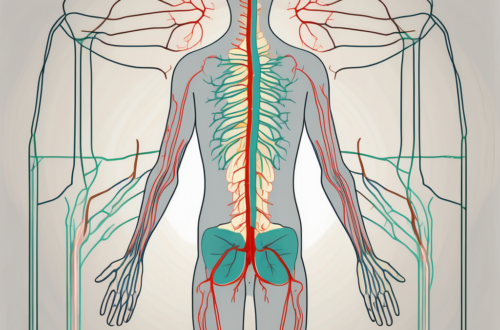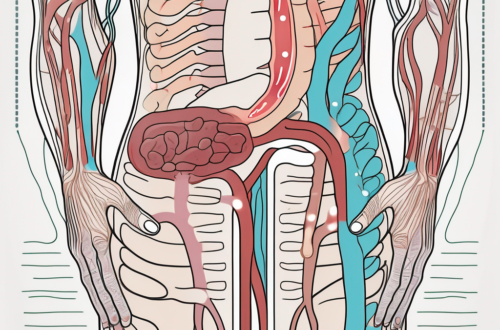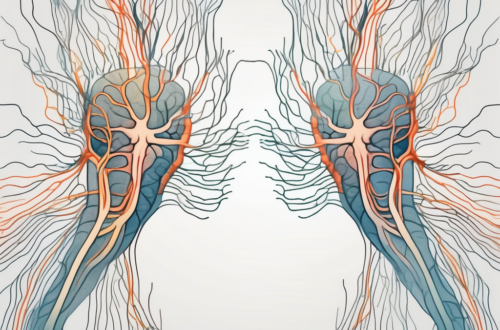Radiation therapy is a common treatment for various types of cancer. While this treatment has proven to be effective in targeting cancer cells, it can also have unintended consequences on surrounding tissues and organs. One area that is particularly vulnerable to radiation damage is the salivary glands. The impact of salivary gland radiation on parasympathetic nerve damage is a topic that is still being studied extensively in the medical field.
Understanding Salivary Gland Radiation
Before we delve deeper into the impact of salivary gland radiation on parasympathetic nerve damage, it’s important to have a comprehensive understanding of how radiation therapy affects the salivary glands.
Radiation therapy is a commonly used treatment for cancer, where high-energy beams are directed at the target area to destroy cancer cells. While this treatment can be effective in eradicating cancer, it can also have unintended consequences on surrounding healthy tissues, including the salivary glands.
The Role of Salivary Glands in the Body
The salivary glands play a crucial role in the digestive process by producing saliva, which aids in the breakdown and digestion of food. Saliva contains enzymes that begin the process of breaking down carbohydrates, making it easier for the body to absorb nutrients. Additionally, saliva helps maintain oral health by flushing away bacteria and neutralizing acids, preventing tooth decay and gum disease.
There are three major pairs of salivary glands in the human body:
- The parotid glands, located in front of the ears, are the largest of the salivary glands. They produce a watery saliva that contains enzymes and antibodies.
- The submandibular glands, located beneath the lower jaw, produce a mixture of mucus and enzymes.
- The sublingual glands, located beneath the tongue, produce a mucous saliva that helps with lubrication.
These glands work together to ensure that the mouth remains moist and that the digestive process is efficient.
The Process of Radiation Therapy on Salivary Glands
During radiation therapy, the high-energy beams are carefully targeted at the cancerous cells to destroy them. However, the salivary glands are often located near or within the target area, making them susceptible to radiation damage.
When the radiation beams come into contact with the salivary glands, they can cause a range of adverse effects. The first is inflammation, where the tissues become swollen and irritated. This inflammation can lead to pain and discomfort for the patient.
Over time, the radiation can also cause fibrosis, a condition where the tissues become thickened and hardened. This fibrosis can further impair the function of the salivary glands, leading to a decrease in saliva production.
The decrease in saliva production can have significant consequences for the patient’s oral health. Without sufficient saliva, the mouth becomes dry, a condition known as xerostomia. Dry mouth can make it difficult to speak, swallow, and taste food. It can also lead to an increased risk of dental problems, such as tooth decay and gum disease.
Furthermore, the lack of saliva can affect the patient’s overall quality of life. Saliva helps with the proper digestion of food, and its absence can cause difficulties in eating and enjoying meals.
In conclusion, while radiation therapy is an important treatment option for cancer, it can have unintended consequences on the salivary glands. The inflammation, fibrosis, and decrease in saliva production can lead to xerostomia and impact the patient’s oral health and overall well-being. It is crucial for healthcare professionals to carefully monitor and manage these side effects to ensure the best possible outcomes for patients undergoing radiation therapy.
Parasympathetic Nerve System: A Comprehensive Overview
In order to fully understand the impact of salivary gland radiation on parasympathetic nerve damage, it is important to have a comprehensive knowledge of the parasympathetic nerve system. The parasympathetic nerve system is one of the branches of the autonomic nervous system, which controls involuntary bodily functions. It works in conjunction with the sympathetic nerve system to maintain homeostasis in the body.
The function of the parasympathetic nerve system is to stimulate normal bodily responses, such as salivation, digestion, and relaxation. It is responsible for maintaining the body’s rest-and-digest state, counteracting the fight-or-flight response triggered by the sympathetic nerve system. The parasympathetic nerves innervate various organs and glands throughout the body, including the salivary glands.
The anatomy of the parasympathetic nerve system is complex and fascinating. The parasympathetic nerve fibers originate from the cranial nerves and sacral nerves. Cranial nerves, such as the vagus nerve (cranial nerve X), play a crucial role in the parasympathetic innervation of many organs, including the salivary glands. These nerve fibers travel through various pathways, forming intricate networks that synapse with the target organs.
When it comes to the salivary glands, the parasympathetic nerves play a vital role in regulating their function and maintaining proper saliva production. The parasympathetic nerves release acetylcholine, a neurotransmitter that binds to specific receptors on the salivary gland cells. This binding triggers a cascade of events that ultimately lead to increased saliva production. The parasympathetic stimulation of the salivary glands is essential for maintaining oral health and facilitating the process of digestion.
Understanding the parasympathetic nerve system is crucial in comprehending the potential consequences of salivary gland radiation on parasympathetic nerve damage. Radiation therapy, while effective in treating certain conditions, can inadvertently damage the delicate nerve fibers of the parasympathetic system, leading to various complications, including dry mouth (xerostomia) and impaired saliva production.
Further research and advancements in medical technology are continuously being made to better understand the parasympathetic nerve system and develop strategies to mitigate the adverse effects of radiation therapy on its function. By gaining a deeper understanding of this intricate system, healthcare professionals can provide more comprehensive care to patients undergoing radiation treatment, ultimately improving their quality of life.
The Connection Between Salivary Gland Radiation and Parasympathetic Nerve Damage
Now that we have a solid foundation on salivary gland radiation and the parasympathetic nerve system, we can explore the intricate connection between the two and how radiation therapy can impact parasympathetic nerve function.
Salivary gland radiation therapy is a common treatment option for head and neck cancers. While it can be effective in targeting and killing cancer cells, it can also have unintended consequences on the surrounding healthy tissues, including the parasympathetic nerves that innervate the salivary glands.
The Impact of Radiation on Nerve Tissues
Radiation therapy can cause damage to both cancerous and healthy tissues. Nerve tissues are particularly sensitive to radiation, and their exposure can lead to various forms of nerve damage. The severity of the damage depends on factors such as the radiation dosage, duration of treatment, and proximity of the nerves to the treatment area.
When radiation is delivered to the salivary glands, it not only targets the cancer cells but also affects the nearby parasympathetic nerves. These nerves play a crucial role in regulating the function of the salivary glands, including the production and secretion of saliva.
Research has shown that radiation can induce inflammation and scarring of the nerves, disrupting their normal signaling process. This disruption can lead to a decrease in the production of saliva, a condition known as xerostomia. Xerostomia can have a significant impact on a patient’s quality of life, causing difficulties in speaking, chewing, and swallowing.
The Specific Effects on the Parasympathetic Nerve System
When the salivary glands are irradiated, the parasympathetic nerves that innervate them can be affected. The radiation can cause inflammation and scarring of the nerves, leading to a disruption in the normal signaling process. As a result, the production of saliva can be significantly reduced, contributing to the development of xerostomia.
Furthermore, the parasympathetic nerve system is responsible for regulating many other bodily functions, including digestion, heart rate, and sexual arousal. Damage to these nerves can have far-reaching effects beyond xerostomia. Patients may experience difficulties in digestion, irregular heart rhythms, and changes in sexual function.
It is important for healthcare professionals to closely monitor patients undergoing salivary gland radiation therapy to identify any signs of parasympathetic nerve damage. Early detection and intervention can help mitigate the long-term effects and improve the patient’s overall quality of life.
Potential Symptoms and Consequences of Parasympathetic Nerve Damage
Parasympathetic nerve damage can have a range of symptoms and consequences that can greatly impact a patient’s quality of life. Understanding these symptoms and consequences is crucial in order to provide appropriate care and support for individuals affected by this condition.
Identifying Symptoms of Parasympathetic Nerve Damage
Common symptoms of parasympathetic nerve damage include dry mouth, difficulty swallowing, altered taste sensation, and an increased risk of dental caries and oral infections. These symptoms can significantly impact a person’s ability to eat, speak, and maintain proper oral hygiene.
Dry mouth, also known as xerostomia, occurs when there is a reduced flow of saliva. Saliva plays a vital role in maintaining oral health by neutralizing acids produced by bacteria, washing away food particles, and aiding in the digestion process. When the parasympathetic nerves responsible for stimulating saliva production are damaged, the mouth becomes dry and uncomfortable.
Difficulty swallowing, known as dysphagia, can occur due to the lack of saliva lubrication in the mouth. This can make it challenging to eat and drink, leading to weight loss, malnutrition, and dehydration if not properly managed. Individuals with dysphagia may need to modify their diet or receive assistance from speech therapists or dieticians to ensure adequate nutrition and hydration.
Altered taste sensation, or dysgeusia, is another common symptom of parasympathetic nerve damage. This can result in a metallic or bitter taste in the mouth, making food less enjoyable. It can also lead to a decreased appetite and weight loss, further impacting an individual’s overall well-being.
Furthermore, the increased risk of dental caries and oral infections is a significant concern for individuals with parasympathetic nerve damage. Without sufficient saliva to wash away bacteria and neutralize acids, the teeth become more susceptible to decay. Additionally, the lack of saliva’s antimicrobial properties can result in an increased risk of oral infections, such as thrush or bacterial overgrowth.
Long-term Consequences of Nerve Damage
While some nerve damage may improve over time, other cases can be permanent. Long-term xerostomia can lead to chronic oral health issues, such as tooth decay, gum disease, and oral fungal infections. The absence of saliva’s protective properties creates an environment conducive to bacterial growth, plaque formation, and subsequent dental problems.
Gum disease, or periodontal disease, is a common consequence of parasympathetic nerve damage. The lack of saliva makes it easier for bacteria to accumulate along the gumline, leading to inflammation, bleeding, and eventually, gum recession. If left untreated, gum disease can progress to more severe forms, causing tooth loss and bone damage.
Oral fungal infections, such as oral thrush, can also occur due to reduced saliva production. The natural antifungal properties of saliva help keep the oral microbiome in balance. Without this protection, opportunistic fungi can overgrow and cause uncomfortable symptoms, including white patches, soreness, and difficulty swallowing.
In addition to the oral health implications, parasympathetic nerve damage can adversely affect speech and taste perception. The lack of saliva can make it challenging to articulate words clearly, leading to difficulties in communication. Moreover, altered taste sensations can diminish the enjoyment of food, affecting the overall quality of life for individuals with this condition.
It is important for healthcare professionals to recognize and address the symptoms and consequences of parasympathetic nerve damage. By providing appropriate treatment and support, individuals affected by this condition can manage their symptoms, maintain oral health, and improve their overall well-being.
Prevention and Treatment Options for Parasympathetic Nerve Damage
Preventing and managing parasympathetic nerve damage is crucial in minimizing its impact on patients undergoing radiation therapy. Parasympathetic nerves play a vital role in regulating various bodily functions, including salivation and digestion. Damage to these nerves can lead to xerostomia, or dry mouth, which can significantly affect a patient’s quality of life.
Strategies for Preventing Nerve Damage during Radiation
Modern radiation techniques aim to minimize the exposure of healthy tissues to radiation. Specialized treatment planning and delivery technologies, such as intensity-modulated radiation therapy (IMRT), can selectively target cancerous cells while sparing surrounding structures, including the salivary glands and parasympathetic nerves. By precisely controlling the radiation dose and targeting only the tumor, the risk of damaging the parasympathetic nerves is significantly reduced.
In addition to advanced radiation techniques, other strategies can be employed to further prevent nerve damage during radiation therapy. For instance, using customized mouthguards or dental stents can help protect the salivary glands and parasympathetic nerves from direct radiation exposure. These devices act as barriers, shielding the sensitive tissues from the harmful effects of radiation.
Furthermore, regular monitoring of the patient’s condition throughout the radiation treatment is essential. By closely observing any early signs of parasympathetic nerve damage, healthcare professionals can intervene promptly and adjust the treatment plan accordingly. This proactive approach allows for timely modifications that can help prevent further damage and preserve the function of the parasympathetic nerves.
Current Treatment Approaches for Parasympathetic Nerve Damage
If parasympathetic nerve damage does occur during radiation therapy, there are various treatment options available to manage the symptoms of xerostomia. These include the use of artificial saliva, salivary substitutes, and medications that stimulate saliva production. Artificial saliva, which mimics the composition of natural saliva, can provide temporary relief for dry mouth symptoms. Salivary substitutes, on the other hand, are specifically designed to lubricate the oral cavity and alleviate discomfort caused by reduced saliva production.
In some cases, medications that stimulate saliva production may be prescribed to patients experiencing severe xerostomia. These medications work by activating the remaining salivary glands and promoting saliva flow. However, it is important to note that these medications may have side effects and should be used under the guidance of a healthcare professional.
Additionally, dental hygiene and regular dental check-ups become even more crucial for preventing dental complications in patients with parasympathetic nerve damage. Dry mouth can increase the risk of dental decay and gum disease, as saliva plays a vital role in maintaining oral health. Therefore, maintaining good oral hygiene practices, such as regular brushing and flossing, along with frequent dental visits, can help minimize the potential dental complications associated with xerostomia.
Future Research Directions in Salivary Gland Radiation and Parasympathetic Nerve Damage
The field of radiation therapy and its impact on salivary gland function and parasympathetic nerve damage continues to evolve, with ongoing research focused on finding new and improved approaches.
Emerging Techniques in Radiation Therapy
Researchers are exploring advanced radiation therapy techniques, such as proton therapy and image-guided radiation therapy, to further minimize damage to the salivary glands and surrounding nerves. These techniques offer enhanced precision and accuracy in delivering radiation while sparing healthy tissues.
Potential Breakthroughs in Nerve Damage Treatment
Scientists are also investigating regenerative therapies and neuroprotective agents that could help repair and protect damaged nerves. These exciting breakthroughs may hold the key to restoring normal parasympathetic function and enhancing patients’ quality of life.
In conclusion, the impact of salivary gland radiation on parasympathetic nerve damage is an important area of study in the field of radiation therapy. Understanding the connection between these two entities can help healthcare professionals tailor treatment plans and provide appropriate support to patients. If you are undergoing radiation therapy or experiencing symptoms of parasympathetic nerve damage, it is essential to consult with a healthcare professional who can provide guidance and personalized care. Together, we can continue to advance our knowledge and improve the outcomes for patients undergoing cancer treatment.





